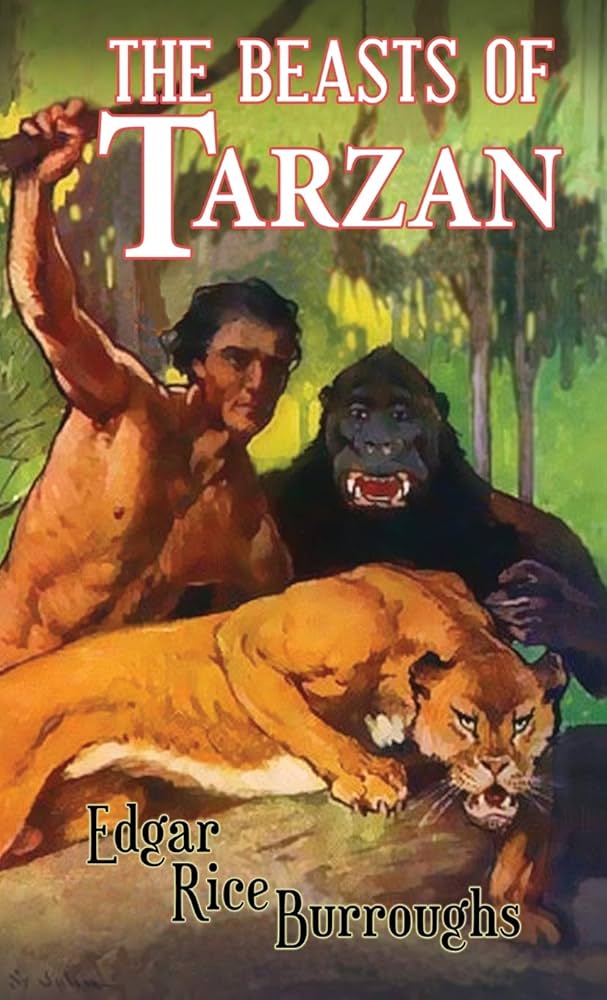Chapter 5 — The beasts of Tarzan
byChapter 5 – The Beasts of Tarzan opens with a plan set in motion as Tarzan reveals his seafaring intentions to Mugambi, who responds with excitement at the chance to return home. The canoe, drawn safely above the tide line, awaits its transformation into a proper vessel. Having gained experience from crafting boats during his time among the cannibal tribes, Tarzan feels confident in his ability to create a seaworthy dugout. Days pass with focus and efficiency as both men prepare for the journey. Mugambi’s heart swells at the thought of returning to his homeland. His loyalty to Tarzan strengthens as their shared goal gives new energy to their actions.
Weaponry becomes their next concern, essential for the trek through hostile terrain. Tarzan, well aware of the dangers lurking in the jungle, chooses medium-length spears over the larger, traditional weapons. Their lighter build suits the agility needed for maneuvering through trees. He also constructs a bow, along with arrows that fly straight and sure, each one honed for deadly precision. With these, Tarzan feels adequately equipped to face whatever challenges await. For Mugambi, however, the situation is different. He has no weapons, leaving him vulnerable in a place where danger could come from any shadow. Tarzan, recognizing this, offers him the tools he created—a gesture of both practicality and trust.
The gift carries more weight than just protection. Among his people, Mugambi knows the spear and bow will elevate his standing, even if his tribe has been reduced to one by Sheeta’s savagery. Holding the weapons stirs something proud and ancestral within him. In a place governed by might and memory, prestige is not easily earned. With Tarzan’s offering, Mugambi gains both respect and security. The two companions, different in origin but alike in resilience, are bound even closer by this exchange. Their alliance is built not on necessity alone, but on understanding and shared purpose. With preparations complete, the dugout waits by the water, its sail ready to catch the wind.
Tarzan and Akut guide the canoe past the dangerous surf with effort and caution. The timing is precise; waves crash as they push off, and the boat wobbles but holds. Mugambi, eager and unafraid, leaps in first, his thoughts fixed on reuniting with his family. Behind him, Tarzan keeps the vessel steady, his movements fluid and practiced. Together, they manage to break free from the shallows and begin the journey across open water. Every paddle stroke brings them closer to the mainland—and to the unknown. Though the sea offers no promises, their bond and preparation create a sense of hope.
Once underway, the rhythm of their travel becomes meditative. The sea, though unpredictable, becomes part of their silent dialogue. Akut, quiet and watchful, mirrors the mood of his companions. There is trust in his stillness, and a readiness in his eyes. Tarzan, ever alert, surveys the horizon while mentally mapping the jungle trails they’ll take once they reach land. The voyage is not just physical—it represents movement toward justice, family, and closure. Beneath the surface of their calm, tension simmers, knowing that their true challenges lie ahead. But this moment, however brief, is one of purpose and unity.
In many traditional societies, journeys are seen as rites of transformation. This voyage carries the same weight for Mugambi, who departs the island not only as a survivor but as someone shaped by trials and loyalty. Tarzan, meanwhile, moves forward with the weight of fatherhood and the burning need to correct wrongs. Though no words pass between them, the shared silence speaks volumes. This crossing becomes a threshold, leading from raw survival toward the confrontation of fate. As their boat cuts through the water, the future remains uncertain, but their hearts are steady. They move not just toward land, but toward the next stage of their story—driven by hope, survival, and the strength of wild loyalty.

